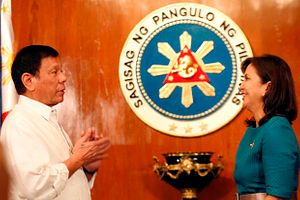Philippine President Rodrigo Duterte on Sunday removed the vice president from a lead role in his anti-drug crackdown just a few weeks after she accepted the post and vowed to make the campaign that has left thousands of suspects dead less bloody.
Presidential spokesman Salvador Panelo cited several reasons for Duterte’s decision to remove Vice President Leni Robredo from a government anti-drug committee, including what he says was her failure to present any new programs to fight the drug menace more than two weeks after she accepted the post.
Presidents and vice presidents are elected separately in the Philippines, resulting in candidates from rival parties like Duterte and Robredo ending up in the country’s top leadership and often colliding on policies.
Robredo, 58, is a respected former human rights lawyer and political newcomer, has openly criticized the campaign against illegal drugs that Duterte launched when he took office in mid-2016.
Piqued by Robredo’s constant criticism of his drug campaign, Duterte formalized an offer last month to appoint her as one of two heads of an inter-agency committee that includes the police and the military and is tasked with overseeing and coordinating the government’s efforts to combat illegal drugs.
“She wasted such opportunity and used the same as a platform to attack the methods undertaken by this administration,” Panelo said. “Such tack was even motivated by hubris to prove their past arguments against the anti-illegal drug operations were correct.”
More than two weeks after accepting the post, Robredo “has not presented any new program that she envisioned to implement. In a campaign where people’s lives are at risk, a day is an eternity,” Panelo said.
“The government cannot twiddle its thumb and sit idly hoping for a flash of brilliance from the vice president,” Panelo said.
Opposition Sen. Risa Hontiveros, however, said Duterte’s offer to Robredo was meant to undermine her politically but it backfired when the vice president accepted it and the president’s camp got “terrified” of what she can do after landing in the top leadership of Duterte’s war on drugs.
“There can be no doubt that the so-called ‘invitation’ to work with the vice president to curb the country’s drug problem was nothing but an insincere sham,” Hontiveros said in a statement. “It also exposed the government’s unwillingness to explore and try new approaches and alternatives in the campaign against illegal drugs.”
Robredo has said that she accepted Duterte’s offer despite warnings by her advisers and allies, so she may be able to save lives under the campaign.
One of her first moves was to request confidential documents from law enforcers, including a list of key drug suspects targeted under Duterte’s campaign. Duterte warned Robredo from sharing confidential information about the anti-drug campaign with his foreign critics, including human rights advocates.
It’s the latest twist in the unprecedentedly massive crackdown Duterte launched after he took office in June 2016. He promised to end illegal drugs and corruption in six months during the campaign but failed and later acknowledged that he was overwhelmed when he found out the immensity of the problems after taking power.
More than 6,300 mostly petty drug suspects have been killed in the crackdown after allegedly resisting arrests and about 1.3 million others have surrendered, officials said. But human rights groups have cited a higher death toll and accused some policemen of killing unarmed suspects based on flimsy evidence and altering crime scenes to make it look like the suspects violently fought back.
At least two complaints for mass murder have been filed before the International Criminal Court over the large-scale deaths, but Duterte has vowed to continue with the bloody campaign up to the last day of his presidency in June 2022.
Duterte and the police have denied condoning extrajudicial killings under the crackdown.
As reported by Jim Gomez in The Associated Press.

































